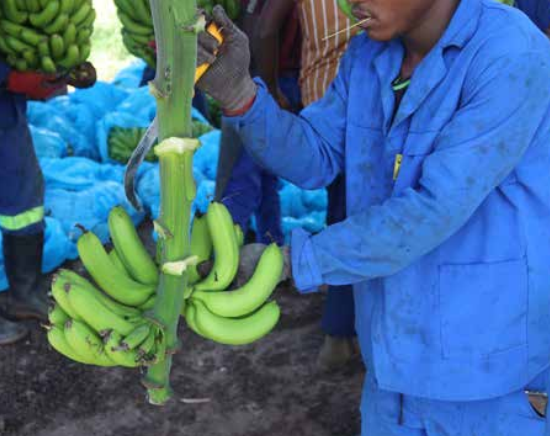
The companies awarded include Avian Ventures Ltd T/A Farm Depot which was awarded with €251, 919, New Rotations Farming Zambia awarded with €998, 702, Seba Foods Zambia Ltd (260 Brands) awarded with €884, 268 and Chisamba Ranching and Cropping awarded with €995, 780.
Other companies include Community Markets for Conservation Ltd (COMACO) awarded with €470, 000, Mount Meru Millers Zambia Ltd awarded with €873, 503, Export Trading Company Ltd awarded with €495, 573, ASBA Resources Ltd awarded with €691, 105, Starke Ayres Zambia Ltd awarded with €469, 741 and Continental Ginnery Ltd awarded with €703, 966.
The awarding of grants to these ten companies brings the total number of successful recipients to fifteen since the start of the challenge fund and awarding of five companies early this year.
Speaking at the awarding ceremony in Lusaka attended by the Zambian Business Times – ZBT, Self Help Africa Country Director Elia Manda said the EZCF is focusing on how agribusinesses can develop and scale more businesses that are inclusive especially those that promote greener and more sustainable investments in agriculture, aquaculture, fisheries and livestock while integrating smallholder farmers in these value chains.
Manda said the expected results from the project includes having 40-45 agribusinesses supported by the fund and contributing towards the increment of the agribusinesses’ turn over by atleast 25% as well as seeing 150, 000 SHF better integrated into sustainable value chains and an increment in produce of SHF by atleast 90%.
He noted that one of the key criteria for approving proposals is that agribusinesses demonstrate how best their activities will contribute to promoting a green economy and have many activities pertaining to the use of climate smart agriculture
Speaking at the same event, Minister of Agriculture Mtolo Phiri said the award ceremony demonstrates government’s commitment to providing an enabling environment to support the growth of agribusinesses and the private sector in Zambia.
Mtolo said the awarding of the first and second round of grants also underscores the European Union’s commitment to supporting government’s agenda to develop the agriculture sector adding that government’s partnership with the European Union will continue to strengthen over time and will be broadened to address various bottlenecks affecting the growth of the sector.
He said government attaches great importance to agriculture because it is key to its agenda to diversify and remodel the economy and believes that transformation of the sector can only be achieved by enhancing agricultural production and productivity, agricultural extension services, market access and value addition among others.
Mtolo noted that access to affordable agricultural finance remains a serious challenge especially for small-scale farmers who have viable plans to expand agricultural production due to high interest rates, limited collateral and limited financial literacy which as a result is difficult for small-scale value chain actors to expand operations.
He mentioned that the Enterprise Zambia Challenge Fund and the concessional loans offered by the European Investment Bank complements government’s efforts to provide affordable agricultural finance and promote agricultural diversification.
He said the initiative aims to promote agricultural diversification and production of crops such as sunflower, groundnuts and soyabeans, which livestock and aquaculture value chains stand to benefit from as such crops, are inputs in the production of stockfeed therefore the growth of the livestock and aquaculture industries will stimulate increased crop production.
Mtolo urged the recipients of the grants to ensure they implement their respective projects to the best of their efforts and assured all partners on the programme that government will actively participate in the monitoring of project activities as that is important in ensuring the overall success of the enterprise project.

And Minister of Fisheries and Livestock Makozo Chikote said agriculture remains one of the key drivers for economic diversification, job creation and income generation for farmers adding that the project resonates well with government’s strong vision aimed at transforming the agricultural sector into an export oriented, diversified, private sector driven, and climate resilient sector.
He said government has realized that it cannot succeed without private sector support in transforming the fisheries and livestock sub sectors therefore the private sector has been challenged to come up with projects and business ventures that can transform the fisheries and livestock sub-sector and the challenge has manifested through the Enterprise Zambia Challenge Fund.
Chikote expressed delight that the second group of the 10 companies has two projects focused on livestock – Chisamba ranching and cropping and ASBA Resources noting that these projects will strengthen different elements of the beef, poultry and leather value chains and provide high-quality protein to low income consumers in the case of Chisamba ranching and cropping.
He said the project would bring about benefits in form of jobs in an agricultural value chain as employees; as producers; suppliers and business owners or through the development of affordable goods and services needed by the vulnerable population.
He has challenged the private sector to develop more quality concept notes that will benefit the livestock and fisheries sub-sector and small-scale farmers adding that the aquaculture window has not had any successful proposals to date.
Speaking at the same event Minister of Green Economy and Environment Collins Nzovu said government has placed a high premium on environmental sustainability and economic development that ensures meaningful and sustainable improvement in the livelihoods of people depends on the extent to which natural resources are managed.
Nzovu said the issues of greenhouse gas emissions and their effects have become real and high variabilities in weather patterns are evidence, with more frequent dry spells, droughts, and flash floods across the country.
He said these are taking a toll on the development prospects, as well as negatively impacting the livelihoods of people hence, the need for effective interventions to be put in place in the form of both mitigation and adaptation.
He noted that the ministry is advocating for an economy that ensures income generation and jobs for people, through economic activities that reduce carbon emissions and pollution, and reduce harm or loss of biodiversity and ecosystem services.
He mentioned that the last couple of years have seen the idea of a “green economy” emerge into the mainstream of policy discourse and it is no longer a concept promoted only by governments but is increasingly evident in the corporate-sector agenda as well.
He added that this promotes a new economic paradigm — one in which material wealth is not earned at the cost of growing environmental degradation, ecological destruction and social disparities.
Nzovu said it was gratifying that Enterprise Zambia is establishing a number of companies, which are promoting organic production, sustainable management of soils, including incorporation of trees into farming systems, and the use of carbon credits to provide additional sources of income to farming communities.







